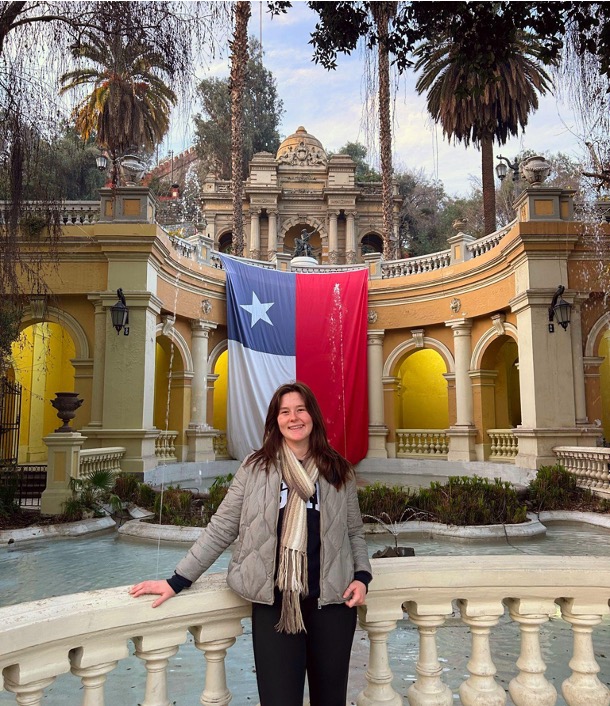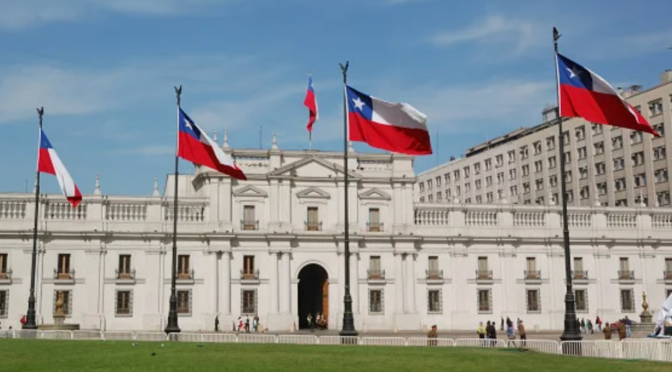By Taylor Crownover, Undergraduate student in the UT Sociology Department and Plan II Honors Program
Upon arriving in Santiago, Chile, it dawned on me that I was further south than I had ever been in my life! Despite this, the time difference with Texas is just one hour ahead. Here I am, on the opposite side of the world, yet aligned longitudinally with my home. This realization has persisted throughout my first month in Chile, where cultural differences are strikingly evident, yet abounding moments of familiarity are also present as I continue immersing myself in the city.
Santiago sits in a valley alongside the ‘cordillera’ — the massive snow-covered Andes Mountain Range. From many lookout points in the city you can see sprawling neighborhoods, the tallest building in South America, parks, and old churches extending seemingly forever into the distance. The city contains almost 50% of Chile’s entire population and the infrastructure to support it is incredible! Coming from Texas, which is severely lacking in public transit, the extensive metro and bus system is a welcome treat. Being located in the opposite hemisphere means that June and July are the middle of winter which was a bit of an adjustment for me. No snow in the city, but the autumn leaves and cold morning air are truly refreshing, and I am happy to skip the Texas summer inferno.

Despite the apparent initial geographic differences, the more time I spent with my Chilean host family and being oriented to the International IDEA fellowship, the more political similarities I noticed between Chile and the United States. The week I arrived, Chilean President Gabriel Boric was hosting the biannual State of the Union, discussing many of the same issues we face in the United States. The rise in renewable energy in the country, the need for more jobs or higher wages, contentious debates about reproductive rights, uncertainties with the uptick of immigration from nearby countries, and overall stark political divisions within the population. Due to a high relative GDP and history of democracy and free market development in the country, Chile is undergoing many similar social processes as the United States.
International IDEA opened its Chile country office in 2022 to support the constitutional reform process that was taking place. Chile’s constitutional reform process was initiated in 2016 and renewed in 2019 due to extensive citizen protests for improved social protections for things such as pension reform, low wages, and rising economic inequality. Unfortunately, the government and citizens were unable to come to a consensus on a new constitution after two different proposals were brought to referendums. However, these events have raised awareness about these social issues, and national governments and organizations like International IDEA are paying increased attention to democratic rights in Chile and South America. The Chilean National Congress collaborates with IDEA by soliciting information about international policies relevant to the country’s goals, such as environmental policy, civic participation, and gender equality.

As an IDEA fellow, I jumped straight into the projects the office is working on to provide support to the Chilean government. The first project focused on an upcoming environmental legislation seminar IDEA was hosting with international experts, including a French ambassador, to share strategies for effectively enhancing sustainability through government policy. I researched recent Chilean environmental legislation and discovered the country’s 2022 laws that reaffirmed its commitment to the Paris Climate Agreement and its 2050 carbon neutrality target. This is especially significant as Chile’s economy has long been based on mining and extracting valuable minerals, including copper, gold, and silver from the Atacama Desert. Additionally, the country has faced extreme drought in the past 10 years and heavy rains and flooding in the last two years. Legislating environmental protections is thus incredibly pertinent as climate change continually impacts the country’s natural resources.
Chile’s new environmental legislation also included an increased push towards renewable energy infrastructure. The country’s diverse geography, ranging from deserts and beaches to high mountains, volcanoes, long coastline, ocean resources, and expansive fields, positions it favorably to harness virtually every form of renewable energy available. As the international community shifts its focus towards green energy transitions, Chile emerges as a pivotal partner crucial to the success of this global effort. Currently, the European Union receives about 80% of its lithium from Chilean mines. Lithium is critical for the green energy transition, as lithium batteries are the most efficient way to store and transport renewable energy. Thus, in late 2023, the European Union ratified a major trade agreement with Chile to exchange knowledge, resources, and raw materials between the regions with virtually no international tax for either party.

I am now supporting the IDEA office on a new request from the Chilean National Congress to collect information on digitalization and technological innovation within the government. We are specifically analyzing how similar countries and entities, including Italy, Germany, and the European Parliament, are integrating new forms of technology into their administrative processes to facilitate better intergovernmental communication. One of the major complaints for governments globally is slow progress and poor communication with citizens on what is happening behind closed doors. By transitioning to digital work, the Chilean National Congress can draft proposals more easily, improve collaboration between committees, and process legislation efficiently. Additionally, maintaining online databases of political information makes it more readily available to the general public which creates more opportunities for citizens to understand and to participate in local politics.
Having reliable avenues to easily participate in government is one key to increasing civic engagement and mitigating democratic disaffection in the population. Chile is making progress in this sphere, beginning in 2019 with the passage of the State Digital Transformation Law, which details a plan to become 100% digital by 2027. Chile is also investigating how to utilize artificial intelligence in administrative duties, holding a meeting recently with representatives from other countries to learn about the benefits of this new technology in this area.

Immersing myself in a culture with a rich and complex history underscores the significance of comprehending the past and its impact on the present world. A crucial aspect of Chile’s current political landscape is the enduring legacy of the Pinochet military dictatorship, which spanned from 1973 to 1990 and created impacts that to ripple through society today. This week, our supervisors took the office on a field trip to the Memory and Human Rights Museum that memorializes the atrocities and lives lost throughout that time. It was profoundly moving to witness primary source materials depicting instances of how the dictatorship manipulated the media and how the final citizen vote that removed Pinochet from office transpired. Additionally, it was eye-opening to gain insight into the negative impact of the United States government on the downfall of President Allende, a democratically elected socialist leader, and its support for the coup that ushered Pinochet into power.
Working with International IDEA in Chile has been an incredible experience. I believe that gaining a deep understanding of another country’s politics will further enhance my understanding of my own. The striking similarities between Chile and Texas are most clearly symbolized by their nearly identical flags. Each day, I delve deeper into this experience and continue feeling increasingly at home in this new place.

